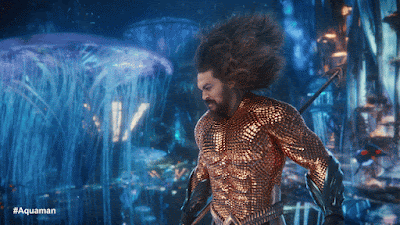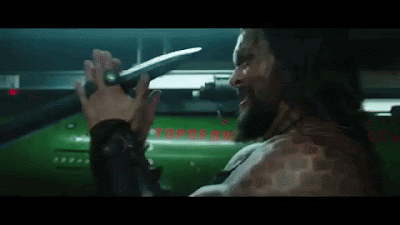or
Basting Away Again in Peter-Jackson-ville
"Everybody's good at something," Arthur (Aquaman) Curry (Jason Momoa) exposits at the beginning of Aquaman and the Lost Kingdom. "Me, I talk to fish. Some people think that makes me a joke. But, I'm also good at something else. Busting heads."
Just what you want from the King of Atlantis. A lot has happened since the first Aquaman movie. Arthur is now the King of Atlantis and he's just managing to keep his head above water, finding that it requires more compromise with the multi-species Atlantean Council than merely busting their heads. He has now "put a ring on it" (and not one of his telekinesis rings) and is married to Mera (Amber Heard—she's in this a lot more than people were gleefully speculating, proving once again that the Internet is a very fallible, mean-spirited place), and they have a son, Arthur Jr. (too many babies to mention), who is just starting to take on Dad's traits. The couple are living at the lighthouse of Arthur's Dad (Temuera Morrison, again) and Mom Atlanna (Nicole Kidman) stops by every so often to help manage the chaos.
But, these are troubling times: Arthur's mentor Vulko (Willem Dafoe, MIA) has died in "the plague" which is glossed over more than at Kennedy for President Headquarters. Half-brother Orm (Patrick Wilson) is in prison for his crimes while King of Atlantis (Hmph. Must be nice.) and the Black Manta (Yahya Abdul-Mateen II) has skipped a couple steps of the grieving process and is still plotting revenge against the A-man for the death of his father and given to going around the lair muttering things like "Every day I don't fix my power-suit is another day Aquaman lives." That's not exactly a good morning affirmation and hints that not only the power-suit has a screw loose. He's aided and abetted by some disposable Manta-mob and Dr. Stephen Shin (Randall Park), one of those brilliant McGyver-esque scientists who can use alien technology on the first try but just not brilliant enough to get a legitimate job.* Dude can't even get a grant!
Anyway, the plot is some nonsense about Manta being so OCD avenging his Father that he puts the entire Earth at risk, seeking out a power source to revive Kordax (Pilou Asbæk), the frozen dead King of the Lost Kingdom of Nekrus, that was banished from the 7 Atlantean kingdoms a long time ago in a Peter Jackson-style flashback. Manta has a found a green-glowing trident (called "the Black trident") with which he can communicate with Kordax, but it's usually a one-sided conversation of Kordax telling him what to do.
So, Aquaman and Atlantis get wind (or current) of all this, and A-man decides that he needs to recruit some help, which he does by springing his brother Orm out of prison, with the help of a invisi-suit, and a stealth octopus by the name of Topo (which stands for Tactical Observation and Pursuit Operative) and, as Mom Atlanna explains he has a "genetically engineered intelligence for infiltration and espionage." "And," she explains further "he also plays a variety of musical instruments" (I only remember him playing drums in the comics, but it's been a while).Orm and Arthur (of course) have "history" so they bicker and feud and bust each other's chops perpetually and it would get very tiresome if it weren't for Momoa's boisterousness and Wilson's acting response to him. Which (in its brilliant way) is to underplay to such a degree that one gets the impression that all of this mayhem and craziness is pretty much run-of-the-mill stuff and as real as clammy palms. I thought Wilson and his Orm character were the dullest part of the first Aquaman feature, but here, he's an absolute tonic of dead-pan stoniness and competence.**
It's needed. The surprise of him is needed because this one feels a bit rote. The first film had all the gee-whizzery of a new play-set, but this one seems to be missing a couple of necessary parts. Oh, it moves like anything, with whooshy, spinny, disorienting action sequences every ten minutes of so, but there are no great set-pieces like the first film's violent mad dash across Sicilian roof-tops. Nothing drops your jaw here.
Except for some of the special effects and not in a good way. The first film was a fun world-builder with its undersea kingdoms and giant seahorses and mounted sharks. But, you get the impression that since the first one was a hit the producers felt they could scrimp on the CGI budget and take full advantage of the murky, shimmery water overlays to hide some dodgy pixelation. There's one whole sequence where it feels like everybody's head is slightly askew of their bodies, and it's a bit of a relief when a sequence shows up with no digital effects at all. But, they're few...and far between.It's a bit of a plunge from what the first one offered, even factoring in the "thrill of the new." This one feels clogged with recycled material--from The Lord of the Rings, Black Panther, even Iron Man. The comic book world is naturally self-reflexive and the same tidal forces apply to comic book movies. You have to do something different, risking the loyalty of fans, to reinvigorate a property, and that is something that producers are not brave and bold enough to do. It's a question of stemming the tide or just becoming back-wash. Forget about Lost Kingdoms. This should have been called Aquaman and the Lost Opportunity.
Aquaman, Storm and Topo...together again.
* Imagine Shin's job interview with Black Manta: "Dr., what do you see as your five-year goals?" "Well, developing a more powerful energy source." "WRONG answer! It should be to KILL Aquaman!" "Uhhhh-huh! (uncomfortable pause)...Do you offer insurance?"
** Ya know who else is good in this movie that you'd never guess? Dolph Lundgren. He was very good in the first Aquaman, but here, he's given more to do and he's subtle and majestic. The man was born to play kings.

























































